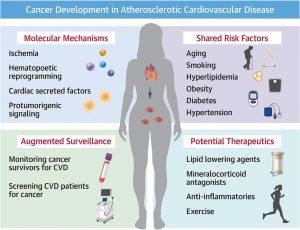New research shows that cutting off blood flow prematurely ages the immune system, creating a cancer-tolerant state that accelerates tumour growth (Figure 1).
Ischemia, caused by blocked or reduced blood flow from fatty deposits and clotting in arteries, is central to conditions such as peripheral artery disease (PAD). Millions of people are affected worldwide, with increased risks of heart attack and stroke. This study shows that PAD may also heighten cancer risk.
In mouse models of breast cancer, restricted blood flow in the leg doubled tumour growth compared to mice with normal circulation. The results build on earlier work by the same team showing that heart attack–induced ischemia had similar effects.
Immune system reprogramming
The team found that ischemia reshapes the bone marrow, forcing stem cells to generate more myeloid cells (monocytes, macrophages, neutrophils) that suppress immune activity, while reducing lymphocytes like T cells that normally fight cancer.
This skewing of the immune system resembled immune aging:
- Tumour environments accumulated immune-suppressive cells, including Ly6Chi monocytes, M2-like macrophages, and regulatory T cells.
- Gene expression shifted to favour tolerance over attack.
- Chromatin remodelling further silenced anti-tumour programs.
These changes were long-lasting, keeping the immune system in a cancer-permissive state even after ischemia resolved.
The findings suggest that PAD patients may benefit from earlier cancer screening and that therapies targeting inflammation could help reverse ischemia-driven immune aging.
Journal article: Dalman, J.M, et al. 2025. Cancer Development in Atherosclerotic Cardiovascular Disease. JACC: CardioOncology.
Summary by Stefan Botha











